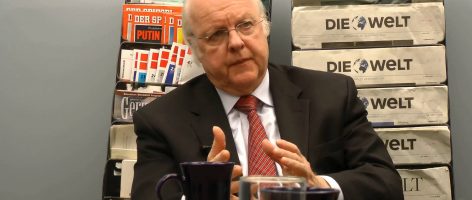Transatlantic Traffic Jams
When the hundreds of government officials and international organization leaders make their way to Washington for the Spring Meetings of the IMF and the World Bank Group, an explosion of …
Burden or Blessing? The Impact of Refugees on Germany’s Labor Market
Germany is in the midst of a heated discussion: Are refugees a burden or a blessing for the German labor market? Supporters of the “blessing” camp argue the country’s aging …
Transportation Gets Tricky for Germany
From April 23 to May 8, German rail operator Deutsche Bahn is expected to close an important stretch of track between Hanover and Kassel for construction work. This closure will …
British Referendum Pains and the EU Implications of BREXIT
On 23 June 2016, should a majority of British voters decide to leave the EU—nearly forty-five years after joining the Community—the EU would lose 17 percent of its GDP and …

From the AGI Bookshelf: Germany’s Role in the Euro Crisis: Berlin’s Quest for a More Perfect Monetary Union
The subtitle of this book, written by a former Research Fellow at AGI, is “Berlin’s Quest for a More Perfect Monetary Union.” The author has reviewed Germany’s efforts to find …
Recent Authors
AGI provides knowledge, insights, and networks as tools to solve the challenges ahead.
Support Our WorkGreater Financial Integration in the Face of Growing Euro-skepticism: The Merger Deal between LSE and Deutsch Börse
On March 16, 2016, the London Stock Exchange Group and Deutsche Börse unveiled a deal to merge the two companies. The deal will create one of the world’s largest exchange …
EU/U.S. Data Flows: New Privacy Shield List
U.S. Data Importers Need to Understand What They Are Getting Into. There was a resounding call for action by regulators and industry and the legal documents are now out in …
Germany’s Outlook on Global Economic Growth
In an article in the International Business Times, AGI President Dr. Jack Janes weighs in on Germany’s role in and outlook toward global economic growth in advance of the G-20 …
International Spillover of EU Disintegration
The Western European message of the 1960s, 1970s, 1980s, and 1990s was fairly clear: More regional economic integration and the building of joint institutions is good for the European Union …
German Auto Industry Faces Obstacles Concerning Emissions, Steel
The German automobile industry has been facing significant obstacles since last September, when Volkswagen (VW) admitted to cheating on U.S. admissions tests by installing software that would deceive regulators in …
International Cyber Agenda: Balance between Privacy and Security Urgently Needed
Days before Apple was ordered to turn over the iPhone of one of the San Bernardino attackers who killed fourteen in December, cyber experts clashed at the Munich Security Conference …




